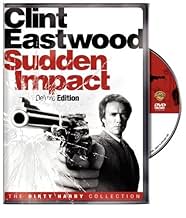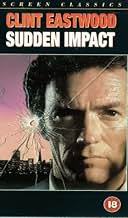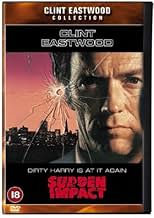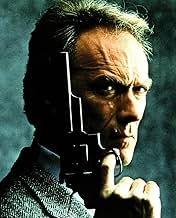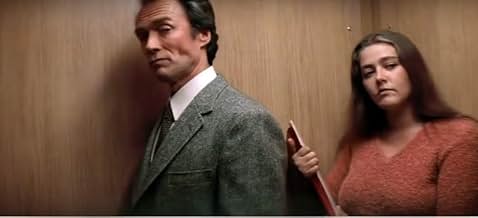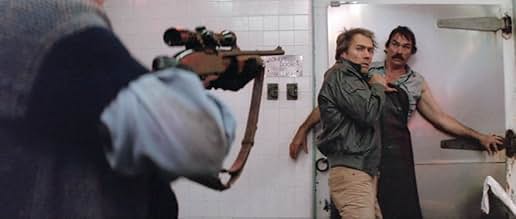When a woman exacts deadly revenge on the aggressors who raped her and her sister ten years earlier, Inspector "Dirty" Harry Callahan is assigned to the case.When a woman exacts deadly revenge on the aggressors who raped her and her sister ten years earlier, Inspector "Dirty" Harry Callahan is assigned to the case.When a woman exacts deadly revenge on the aggressors who raped her and her sister ten years earlier, Inspector "Dirty" Harry Callahan is assigned to the case.
- Awards
- 3 nominations
Audrie Neenan
- Ray Parkins
- (as Audrie J. Neenan)
Storyline
Did you know
- TriviaCharles B. Pierce wrote the line "Go ahead, make my day." The line was inspired by a warning that his father would say to Pierce when he was a child. According to Pierce, his father warned him "When I come home tonight and the yard has not been mowed, you're gonna make my day."
- GoofsAs Horace exits the car while visiting Harry, who is about to begin target shooting in the woods, one of the Panavision cameras is clearly visible, reflected in the car window, as well as Eastwood's son, who was visiting the set.
- Quotes
[Callahan dares a crook to shoot his hostage]
Harry Callahan: Go ahead, make my day.
- Alternate versionsJust like with the previous movies, the 5.1 DVD/Blu-ray remix replaces a bunch of sound effects (mostly gunshots) with more modern ones. However, in addition to that right before the carnival shootout at the end, originally when Harry was approaching the villains, the music had a very loud screeching sound, but the remix completely removes it. (but remains intact on the soundtrack and foreign mono tracks)
- ConnectionsFeatured in At the Movies: Christine/Silkwood/Sudden Impact/Thriller (1983)
- SoundtracksTHIS SIDE OF FOREVER
Performed by Roberta Flack
Music by Lalo Schifrin
Lyrics by DeWayne Blackwell (as Dewayne Blackwell)
Featured review
The vigilante has long held a fascination for audiences, inasmuch as it evokes a sense of swift, sure justice; good triumphs over evil and the bad guy gets his deserts. It is, in fact, one of the things that has made the character of Dirty Harry Callahan (as played by Clint Eastwood) so popular. He carries a badge and works within the law, but at heart, Harry is a vigilante, meting out justice `his' way, which often puts him in conflict with his own superiors, as well as the criminals he's pursuing. But it's what draws the audience; anyone who's ever been bogged down in bureaucratic nonsense of one kind or another, delights in seeing someone cut through the red tape and get on with it-- even if it's only on the screen. And that satisfaction derived from seeing justice done-- and quickly-- is one of the elements that makes `Sudden Impact,' directed by and starring Eastwood, so successful. In this one, the fourth of the series, while working a homicide, Harry encounters a bona fide vigilante at work-- an individual whose brand of justice parallels his own, with one exception: Whoever it is, he's definitely not carrying a badge.
In his own inimitable way, Inspector Callahan has once again ended up on the bad side of the department and is ordered to take some vacation time. So he does; as only `Dirty Harry' can. In a small town north of San Francisco, Harry finds himself smack dab in the middle of a homicide case, which he quickly links to a recent murder in San Francisco because of the unique M.O. employed by the perpetrator. Unaccountably, Harry encounters resistance from the local Police Chief, Jannings (Pat Hingle), who advises him to take his big city tactics and methods elsewhere. Not one to be deterred, however, Harry continues his investigation, which ultimately involves a beautiful and talented young artist, Jennifer Spencer (Sondra Locke). Gradually, Harry discovers a link between the victims; the burning question, though, is where does Jennifer Spencer fit into the picture?
Eastwood is in top form here, both in front of and behind the camera, and it is arguably the second best of the five-film series, right behind the original `Dirty Harry.' It had been seven years since the last `Harry' offering (`The Enforcer,' 1976), but Eastwood steps right back into the character with facility and renewed vigor. And this one definitely benefits from having him in the director's chair, as he is able to recapture the essence of, not only his own character, but that `spirit' that made these films so successful, and he does it by knowing the territory and establishing a continuity that all but erases that seven year gap between #s 3 and 4. As with all the films he directs, Eastwood sets a deliberate pace that works perfectly for this material and creates just enough tension to keep it interesting and involving from beginning to end.
The screenplay, by Joseph Stinson, is well written and formulated to that distinctive `Dirty Harry' style; the dialogue is snappy and the story itself (conceived by Charles B. Pierce and Earl E. Smith) is the most engaging since the original `Dirty Harry,' as it successfully endeavors to play upon the very personal aspects of the drama, rather than entirely upon the action. The characters are well drawn and convincing, and, of course, this is the film that gave us one of Harry's best catch-phrases: `Go, ahead-- make my day...'
As Harry, Clint Eastwood perfectly embodies all of the elements that make this character so popular: He lives by a personal moral code, a true individual made of the kind of stuff we envision as that of the pioneers who settled this country and made America what it is today. Harry personifies that sense of freedom and justice we all strive for and hold so dear, possibly more so today than ever before. No matter who we are or where we come from, there's undeniably a part of us that wants to be Harry, or at least have him around. `Dirty Harry' is an icon of the cinema, and it's impossible to envision anyone but Eastwood portraying him; for better or worse, Eastwood `is' Dirty Harry, without question, just as Sean Connery is James Bond and Basil Rathbone, Sherlock Holmes.
Sondra Locke is entirely effective here in the role of Jennifer Spencer, a young woman wronged and out for vengeance, or as she sees it, `justice.' She manages to bring a hard-edged determination laced with vulnerability to her character, with a convincing, introspective approach that is far beyond what is typical of the `action' genre. Even amid the violence, Locke keeps her focus on Jennifer and the traumatic events that have brought her to this stage of her life. Her portrayal makes a perfect complement to Eastwood's Harry, and becomes, in philosophy and deed, something of his counterpart.
In supporting roles, two performances stand out: Paul Drake, as Mick, creates the best `psycho' since Andy Robinson's dynamic portrayal of the serial killer in the original `Dirty Harry.' With actually very limited screen time, Drake establishes a genuinely disconcerting presence that is believable and convincing, which adds much to the purely visceral response of the audience. This is the guy you can't wait to see Harry take care of in the end. Also effective is Audrie J. Neenan, who makes her character, Ray Parkins, the epitome of the proverbial `low life,' who can be found in any bar in any city. It's a performance that evokes a gut-level response, and it adds greatly to the credibility of the film, in that it helps provide that necessary sense of realism.
The supporting cast includes Albert Popwell (Horace), Mark Kevloun (Bennett) and Nancy Parsons (Mrs. Kruger). With a perfect blend of drama and action, `Sudden Impact' dispenses justice that is a fulfilling respite from reality; the perfect justice of a not-so-perfect world, that makes for a satisfying cinematic experience. 9/10.
In his own inimitable way, Inspector Callahan has once again ended up on the bad side of the department and is ordered to take some vacation time. So he does; as only `Dirty Harry' can. In a small town north of San Francisco, Harry finds himself smack dab in the middle of a homicide case, which he quickly links to a recent murder in San Francisco because of the unique M.O. employed by the perpetrator. Unaccountably, Harry encounters resistance from the local Police Chief, Jannings (Pat Hingle), who advises him to take his big city tactics and methods elsewhere. Not one to be deterred, however, Harry continues his investigation, which ultimately involves a beautiful and talented young artist, Jennifer Spencer (Sondra Locke). Gradually, Harry discovers a link between the victims; the burning question, though, is where does Jennifer Spencer fit into the picture?
Eastwood is in top form here, both in front of and behind the camera, and it is arguably the second best of the five-film series, right behind the original `Dirty Harry.' It had been seven years since the last `Harry' offering (`The Enforcer,' 1976), but Eastwood steps right back into the character with facility and renewed vigor. And this one definitely benefits from having him in the director's chair, as he is able to recapture the essence of, not only his own character, but that `spirit' that made these films so successful, and he does it by knowing the territory and establishing a continuity that all but erases that seven year gap between #s 3 and 4. As with all the films he directs, Eastwood sets a deliberate pace that works perfectly for this material and creates just enough tension to keep it interesting and involving from beginning to end.
The screenplay, by Joseph Stinson, is well written and formulated to that distinctive `Dirty Harry' style; the dialogue is snappy and the story itself (conceived by Charles B. Pierce and Earl E. Smith) is the most engaging since the original `Dirty Harry,' as it successfully endeavors to play upon the very personal aspects of the drama, rather than entirely upon the action. The characters are well drawn and convincing, and, of course, this is the film that gave us one of Harry's best catch-phrases: `Go, ahead-- make my day...'
As Harry, Clint Eastwood perfectly embodies all of the elements that make this character so popular: He lives by a personal moral code, a true individual made of the kind of stuff we envision as that of the pioneers who settled this country and made America what it is today. Harry personifies that sense of freedom and justice we all strive for and hold so dear, possibly more so today than ever before. No matter who we are or where we come from, there's undeniably a part of us that wants to be Harry, or at least have him around. `Dirty Harry' is an icon of the cinema, and it's impossible to envision anyone but Eastwood portraying him; for better or worse, Eastwood `is' Dirty Harry, without question, just as Sean Connery is James Bond and Basil Rathbone, Sherlock Holmes.
Sondra Locke is entirely effective here in the role of Jennifer Spencer, a young woman wronged and out for vengeance, or as she sees it, `justice.' She manages to bring a hard-edged determination laced with vulnerability to her character, with a convincing, introspective approach that is far beyond what is typical of the `action' genre. Even amid the violence, Locke keeps her focus on Jennifer and the traumatic events that have brought her to this stage of her life. Her portrayal makes a perfect complement to Eastwood's Harry, and becomes, in philosophy and deed, something of his counterpart.
In supporting roles, two performances stand out: Paul Drake, as Mick, creates the best `psycho' since Andy Robinson's dynamic portrayal of the serial killer in the original `Dirty Harry.' With actually very limited screen time, Drake establishes a genuinely disconcerting presence that is believable and convincing, which adds much to the purely visceral response of the audience. This is the guy you can't wait to see Harry take care of in the end. Also effective is Audrie J. Neenan, who makes her character, Ray Parkins, the epitome of the proverbial `low life,' who can be found in any bar in any city. It's a performance that evokes a gut-level response, and it adds greatly to the credibility of the film, in that it helps provide that necessary sense of realism.
The supporting cast includes Albert Popwell (Horace), Mark Kevloun (Bennett) and Nancy Parsons (Mrs. Kruger). With a perfect blend of drama and action, `Sudden Impact' dispenses justice that is a fulfilling respite from reality; the perfect justice of a not-so-perfect world, that makes for a satisfying cinematic experience. 9/10.
Details
Box office
- Budget
- $22,000,000 (estimated)
- Gross US & Canada
- $67,642,693
- Opening weekend US & Canada
- $9,688,561
- Dec 11, 1983
- Gross worldwide
- $67,642,693
Contribute to this page
Suggest an edit or add missing content



